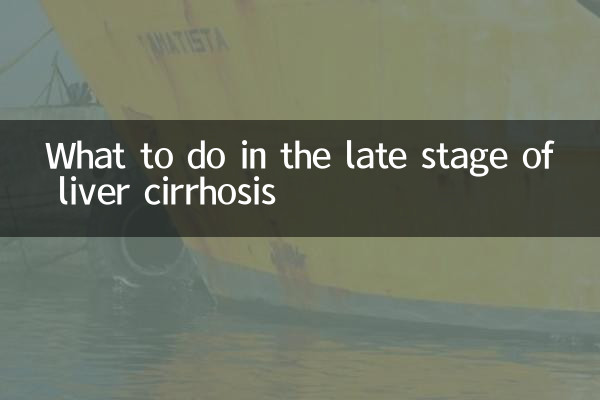What to do in the late stage of liver cirrhosis
Late stage cirrhosis is the terminal stage of liver disease, which is serious and difficult to treat. With the advancement of medical technology, although liver cirrhosis cannot be completely reversed, scientific treatment and care can delay the progression of the disease and improve the quality of life. The following are comprehensive solutions for late-stage liver cirrhosis, compiled based on recent hot topics and hot content.
1. Symptoms and diagnosis of advanced liver cirrhosis

Patients with advanced liver cirrhosis usually have the following symptoms: ascites, jaundice, gastrointestinal bleeding, hepatic encephalopathy, etc. The following are common symptoms and diagnosis methods of late-stage liver cirrhosis:
| symptom | Possible reasons | diagnostic methods |
|---|---|---|
| ascites | Portal hypertension, hypoalbuminemia | Abdominal ultrasound, abdominal puncture |
| jaundice | Liver failure, bile duct obstruction | Liver function test, bilirubin test |
| gastrointestinal bleeding | Rupture of esophageal and gastric varices | Gastroscopy, CT angiography |
| hepatic encephalopathy | Elevated blood ammonia, liver failure | Blood ammonia test, neuropsychological test |
2. Treatment options for advanced liver cirrhosis
The treatment of late-stage liver cirrhosis mainly includes drug treatment, surgical treatment and supportive care. The following are common treatment options:
| Treatment | Specific measures | Applicable people |
|---|---|---|
| drug treatment | Diuretics, antibiotics, ammonia-lowering drugs | Patients with ascites, infection, and hepatic encephalopathy |
| surgical treatment | Liver transplantation, TIPS (transjugular intrahepatic portosystemic shunt) | Patients with liver failure and portal hypertension |
| supportive care | Nutritional support, psychological counseling | All patients with advanced cirrhosis |
3. Daily care for advanced liver cirrhosis
The care of patients with advanced liver cirrhosis is crucial. The following are the key points of daily care:
1.diet modification: Low-salt, low-fat, high-protein diet, avoid alcohol and spicy food.
2.Regular monitoring: Regularly check liver function and ascites to prevent complications.
3.psychological support: Patients with advanced liver cirrhosis are prone to anxiety and depression, and their families should provide them with adequate care.
4.moderate exercise: Choose light activities according to your physical condition to avoid overexertion.
4. Latest research progress in late stage liver cirrhosis
Recently, the medical community has made some new progress in the treatment of liver cirrhosis:
| field of study | Latest findings | potential impact |
|---|---|---|
| stem cell therapy | Using stem cells to repair damaged liver cells | May slow progression of cirrhosis |
| Artificial Intelligence Assisted Diagnosis | AI Algorithm Predicts Risk of Complications of Liver Cirrhosis | Improve the success rate of early intervention |
| Targeted drugs | New anti-fibrosis drug enters clinical trials | Potential to reduce liver tissue damage |
5. Preventive measures for late stage liver cirrhosis
Although late-stage liver cirrhosis is difficult to reverse, early prevention can reduce the risk of the disease:
1.Control hepatitis: Patients with hepatitis B and hepatitis C should take active antiviral treatment.
2.Quit drinking: Long-term alcohol abuse is one of the main causes of liver cirrhosis.
3.healthy eating: Avoid high-fat and high-sugar diet to prevent fatty liver.
4.Regular physical examination: Early detection of liver problems and timely intervention.
Conclusion
The treatment of late-stage liver cirrhosis requires multidisciplinary collaboration. Patients and their families should actively cooperate with doctors and adopt scientific treatment and nursing measures. Despite the severity of the condition, the quality of life can be effectively improved through reasonable intervention. In the future, with the development of medical technology, greater breakthroughs are expected in the treatment of liver cirrhosis.

check the details

check the details